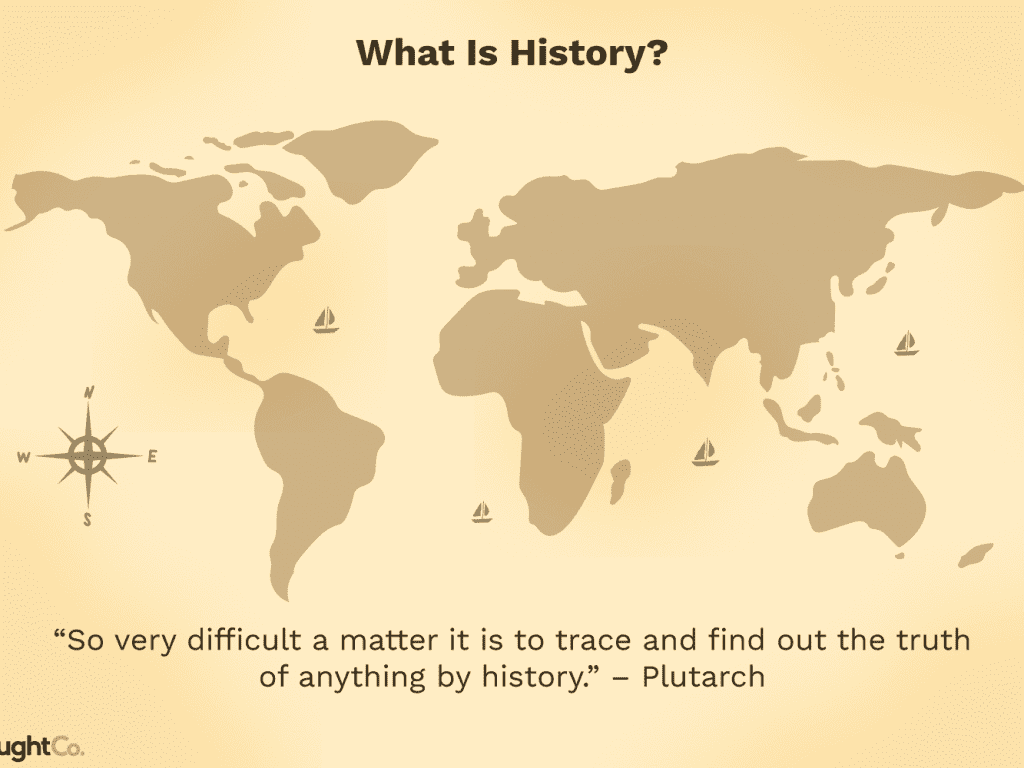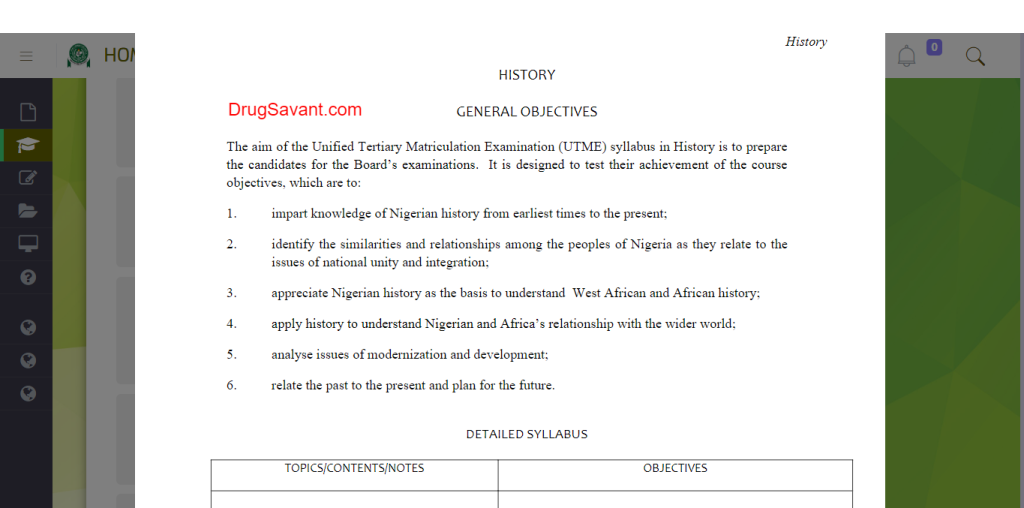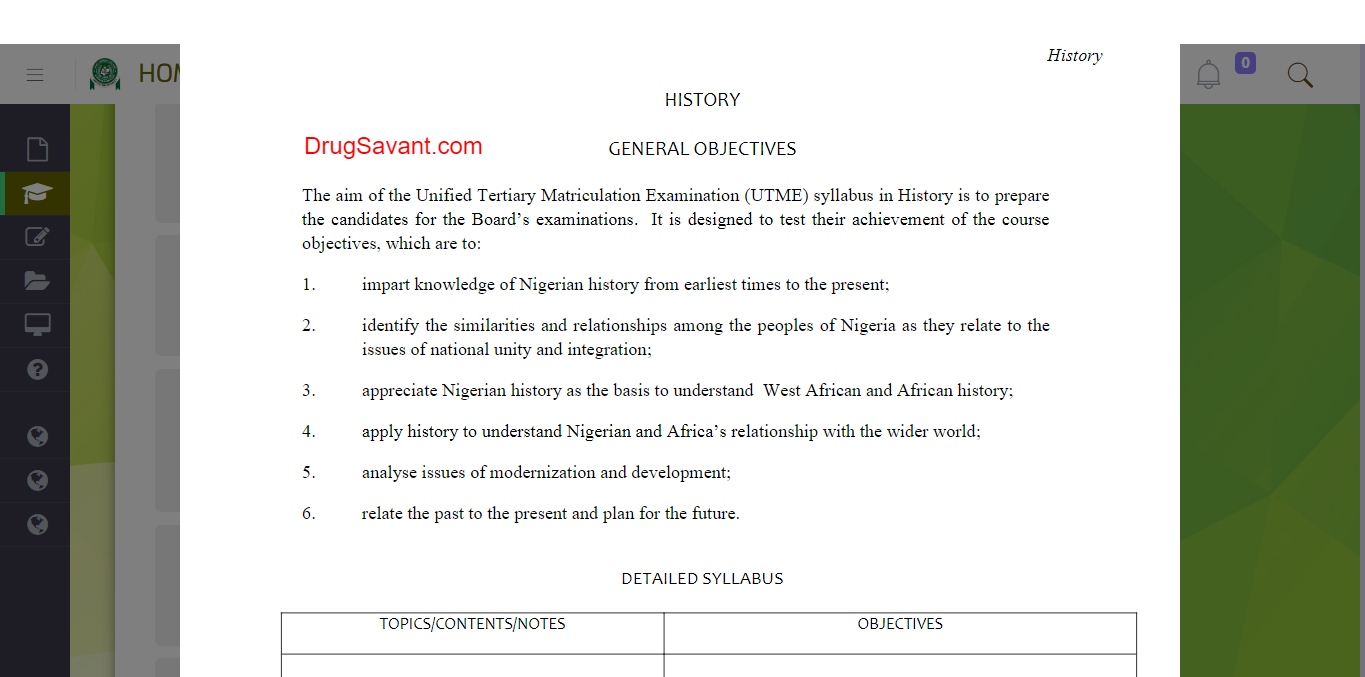JAMB History Syllabus 2024/2025: Is JAMB Syllabus for History out for this year’s JAMB? when will JAMB syllabus for History be out?” what topics do JAMB set questions from History the most? what is the most repeated topic in JAMB History?
Welcome SAVANT! to another exciting episode of “JAMB Doctor Series” in this episode we will provide you with the official topics recognize by JAMB, which you are expected to be a guru in before entering the hall to sit for your JAMB History Exam. STAY TUNED!

Have you ever wondered where you can find the topics for History JAMB normally asks or the most repeated topics or question in JAMB History? then you are a step away from finding your answer.
The short answer to the above question is “JAMB Syllabus”, in fact, JAMB Syllabus is the only expo you will be getting as you prepare for 2024/2025 UTME Exams, this syllabus contains area of concentrations and topics your questions will be asked from.
Read Also: WAEC Marking Scheme For All subjects: Grading System
ARE YOU ON TELEGRAM? Subscribe To My Telegram Channel For Frequent Updates & Guide by clicking the "SUBSCRIBE NOW" button below.
Any smart students would cherish this piece (Syllabus) and make effective use of it, the fact that you are searching for this now, simply means you are in the right direction. You should see my top notch guide on How To Pass JAMB With High Score (300+).
What Is JAMB History Syllabus?

JAMB Syllabus for History is a collection of topics the board expects you to be well grounded in before the exam.
If History is one of the subjects you will sit for in JAMB, then you need this syllabus, these were actually compiled by JAMB, so it is something you can rely on.
Read also: JAMB Profile 2024/2025: How To Create & Access It (All To Know)
JAMB Syllabus For History

JAMB History syllabus is designed to evaluate your ability to:
- Impart knowledge of Nigerian history from earliest times to the present;
- Identify the similarities and relationships among the people of Nigeria as they relate to the issues of national unity and integration;
- Appreciate Nigerian history as the basis to understand West African and African history;
- Apply history to understand Nigerian and Africa’s relationship with the wider world;
- Analyse issues of modernization and development;
- Relate the past to the present and plan for the future.
Download your copy of the syllabus using the download link below👇
Below is a detailed syllabus for JAMB History, you can bookmark this page for easy access to this page. ENJOY!
SECTION A: THE NIGERIA AREA UP TO 1800
1. Land and Peoples of the Nigeria Area
Topics:
- Geographical zones and the people.
- The people’s relationship with the environment
- Relations and integration among the peoples of different zones.
2. Early Centres of Civilization:
Topics:
- Nok, Daima, Ife, Benin, Igbo Ukwu and Iwo Eleru
- Monuments and shelter systems: (Kuyambana, Durbi-ta-Kusheyi, city walls and palaces)
3. Origin and formation of States in the Nigeria Area
Topics:
- Central Sudan -Kanuri and Hausa, states.
- Niger-Benue Valley – Nupe, Jukun, Igala, Idoma, Tiv and Ebira
- Eastern Forest Belt – Igbo and Ibibio
- Western Forest Belt – Yoruba and Edo
- Coastal and Niger-Delta – Efik, Ijo, Itsekiri and Urhobo
- Factors influencing their origin and migration
- Social and political organizations
- Inter-State relations, religion war and peace.
4. Economic Activities and Growth of States:
Topics:
- Agriculture – hunting, farming, fishing, animal husbandry and horticulture.
- Industries – pottery, salt-making, iron-smelting, blacksmithing, leather-working, wood-carving, cloth-making, dyeing and food processing.
- Trade and trade routes:- local, regional, long distance, including trans-Sahara trade?
- Expansion of states.
5. External Influences:
Topics:
- North Africans/Arabs
- iintroduction, spread and impact of Islam;
- trans-Saharan trade.
- Europeans:
- early European trade with the coastal states.
- the trans-Atlantic slave trade (origin, organization and impact)
SECTION B: THE NIGERIA AREA 1800 – 1900
Topics:
- The Sokoto Caliphate, The Sokoto Jihad – (causes, courses and consequence)
- The causes and the process of the jihad
- The establishment and administration of the caliphate and relations with neighbours
- The achievements and impact of the caliphate.
- The collapse of the caliphate.
2. Kanem-Borno
Topics:
- The collapse of the Saifawa dynasty
- Borno under the Shehus
- Borno under Rabeh
3. Yorubaland:
Topics:
- The fall of the Old Oyo Empire
- The Yoruba wars and their impact
- The peace treaty of 1886 and its aftermath
4. Benin
Topics:
- Internal political development
- Relations with neighbours
- Relations with the Europeans
5. Nupe
Topic:
- Internal political development
- Relations with neighbours.
6. Igbo
Topics:
- Internal political development
- Relations with neigbhours.
7. Efik
Topics:
- Internal political development
- Relations with neigbhours
8. European Penetration and Impact:
Topics:
- European exploration of the interior.
- The suppression of the trans-Atlantic slave trade.
- The development of commodity trade and rise of consular authority.
- Christian missionary activities.
- The activities of the trading companies
- Impact of European activities on the coast and the hinterland.
9. British Conquest of the Nigeria Area:
Topics:
- Motives for the conquest
- Methods of the conquest and its result.
- Resistance to and aftermath of the conquest.
SECTION C: NIGERIA 1900 – 1960
1. The Establishment of Colonial Rule up to 1914:
Topics:
- Administration of the protectorates
2. The Amalgamation of 1914:
Topics:
- Reasons
- Effects
3. Colonial Administration After the Amalgamation:
Topics:
- Central Administration:- Legislative and Executive Councils
- Indirect Rule – reasons, working and effects
- Local administrative institutions, Native Authorities, Native Courts and Native Treasuries.
- Resistance to colonial rule – Ekumeku Movement in Asaba hinterland 1898 – 1911, the Satiru uprising 1906, Egba and the Anti-tax Agitation 1918, and the Aba Women Movement in 1929.
4. The Colonial Economy:
Topics:
- currency, taxation and forced labour
- Infrastructure (transportation, post and telecommunication)
- Agriculture
- Mining
- Industry
- Commerce
- Banking.
5. Social Development under Colonial Rule:
Topics:
- Western education
- Urbanization/social integration
- Improvement unions
- Health institutions
6. Nationalism, Constitutional Developments and Independence:
Topics:
- The rise of nationalist movements;
- The 1922 Clifford Constitution and the rise of Nigeria’s first political party.
- World War II and the agitation for independence
- The Richards Constitution of 1946
- The Macpherson Constitution of 1951.
- Party politics – regionalism, federalism and minorities agitations.
- Lyttleton Constitution of 1954.
- constitutional conference in Lagos in 1957 and in London in 1958
- The general elections of 1959 and independence in 1960
SECTION D: NIGERIA SINCE INDEPENDENCE
1. The politics of the First Republic and Military intervention
Topics:
- Struggle for the control of the centre;
- Issue of revenue allocation
- Minority question
- The 1962/63 census controversies
- The Action Group crisis and the General Elections of 1964/65.
- The coup d’etat of January 1966 and the Ironsi Regime.
2. The Civil War:
Topics:
- Cause and effects
- Causes
- Course
- Effects
3. The Gowon Regime
4. Murtala/Obasanjo Regime
5. The Second Republic
6. The Buhari Regime
7. The Babangida Regime
8. The Interim National Government (ING)
9. The Abacha Regime
10. Nigeria in International Organizations;
Topics:
- Economic Community of West African States (ECOWAS),
- African Union (AU)
- Commonwealth of Nations
- Organization of Petroleum Exporting Countries (OPEC)
- United Nations Organization
- The role of Nigeria in Conflict Resolution
PART II: AFRICA AND THE WIDER WORLD SINCE 1800
SECTION A: WEST AND NORTH AFRICA
1. Islamic Reform Movements and State Building in West Africa:
Topics:
- Relationship between Sokoto and other Jihads.
- The Jihads of Seku Ahmadu and Al-Hajj Umar
- The activities of Samori Toure
2. Sierra Leone, Liberia and Christian Missionary Activities in West Africa
Topics:
- The foundation of Sierra Leone and Liberia and the spread of Christianity
- The activities and impact of Christian missionaries.
3. Egypt under Mohammed Ali and Khedive Ismail:
Topics:
- The rise of Mohammad Ali and his reforms
- Mohammad Ali’s relations with the Europeans
- Ismail’s fiscal policies
- The British occupation of Egypt
4. The Mahdi and Mahdiyya Movement in the Sudan
Topics:
- Causes
- Course
- Consequences
SECTION B: EASTERN AND SOUTHERN AFRICA
1. The Omani Empire
Topics:
- The rise of the Omani Empire
- The empire’s commercial and political relations with the coast and the hinterland.
- The Empire’s relations with the Europeans
2. Ethiopia in the 19th century
Topics:
- The rise of Theodore II and his attempt at the unification of Ethiopia
- Menelik II and Ethiopian independence
3. The Mfecane:
Topics:
- The rise of the Zulu Nation
- Causes, Course and consequences of the Mfecane
4. The Great Trek
Topics:
- The frontier wars
- British intervention in the Boer African relations
- The Great Trek and its consequences
SECTION C: IMPERIALISM, COLONIALISM AND PROBLEMS OF NATION-BUILDING IN AFRICA
1. The New Imperialism and European Occupation of Africa
Topics:
- The New Imperialism in Africa
- European scramble for Africa
- The Berlin Conference
- The occupation and resistance by Africans
2. Patterns of Colonial Rule in Africa:
Topics:
- The British
- The French
- The Portuguese
- The Belgians
3. The Politics of Decolonization
Topics:
- Colonial policies and African discontent
- The impact of the two world wars
- Nationalist activities and the emergence of political parties and associations
- Strategies for attaining independence
4. Apartheid in South Africa
Topics:
- The origin of apartheid
- Rise of Afrikaner nationalism
- Enactment of apartheid laws
- Internal reaction and the suppression of African nationalist movements
- External reaction to apartheid, the Frontline States, the Commonwealth of Nations, OAU and the UN.
- The dismantling of apartheid
- Post-apartheid development
5. Problems of Nation-building in Africa
Topics:
- Political and economic challenges and constraints
- Physical and environmental challenges
- Ethnic and religious pluralism
- Military intervention and political instability.
- Neo-colonialism and under -development.
- Boundary disputes and threat to African unity
- Civil wars and the refugee problem.
Frequently Asked Questions
How Many Questions JAMB Sets In History?
The total number of questions JAMB asked in History is 40, with each question carrying 2.5 marks.
This means if after answering History, you were able to answer 30 questions correctly in JAMB you have been able to secure 75 marks for yourself.
JAMB Recommended Textbooks For History
To make sure your reading is inline with what your should know, JAMB has prepared a list of textbooks that will help you achieve that purpose.
Is JAMB History Syllabus For 2024 Out?
YES, JAMB syllabus for History is out.
In Conclusion
It is advisable you go through these topics listed here, as they would help you have a more directed preparation and reading for History in JAMB.
This will be all for now, I understand you may have a question or two to ask, feel free to drop them using the comment box below!
Ensure to share this with friends on Facebook, Whatsapp, or any other social media network you can connect them with…
Related Searches... a. Jamb syllabus for history pdf download b. Jamb syllabus for history pdf c. Jamb syllabus for history 2024 d. jamb syllabus for all courses



